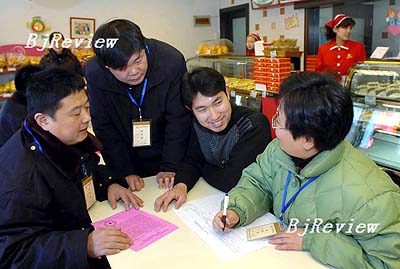|

China will conduct its second national economic census in 2008 in order to collect accurate data for its rational policy formation. The census aims to gather information on the layout and energy consumption of all industrial and service entities in 2008. The results will facilitate more effective macroeconomic controls and more rational mid- and long-term economic planning, according to the State Council. Spokesman of the National Bureau of Statistics, the organizer of the census, answered several questions about the census on its website. The following is an excerpt from that transcript:
The State Council decided to conduct the second national economic census in 2008, four years after the first census. How was the timing of the census decided?
The National Bureau of Statistics, the National Development and Reform Commission (NDRC) and the Ministry of Finance jointly released a notification on the adjustment of the timeline for the national censuses on August 11, 2003, regarding the decision to conduct economic censuses twice every 10 years, respectively in the third and the eighth years of each decade. The planned first census was postponed and conducted in 2004 because of the SARS epidemic in 2003. The State Council officially enacted the Regulation on National Economic Census (referred to here as "the Regulation") on September 5, 2004, stipulating that the national economic census be conducted every five years.
What is covered in the second national economic census? What changes have been made compared to the first one?
The census will cover the basic characteristics of legal entities, employees, financial situations, production and business operation situations, production capacity, consumption of raw materials and energy, as well as scientific and technological activities. Compared with the first census, we will expand the second census to include more major raw material data, energy as well as water consumption.
What is the reference period for the second census? How long will the census span?
The reference period for the second economic census is as of December 31, 2008 and the flow data cover the entire year of 2008. We have been working on a general plan for the national economic census this year and will mobilize census organizations at all levels to do preliminary work for the census in line with the planning of the State Council in 2008. We plan to conduct a trial run of the census and complete the data gathering next year, prepare for the data registration, checking, processing as well as the release of an announcement in 2009. We plan to publish the data and then conduct research related to the data in 2010.
What measures have been implemented to guarantee that the second census be smoothly carried out?
The census will cover 19 sectors except agriculture, involving about 8 million entities and more than 30 million self-employed individuals. As a result, this task puts high requirements on us.
The State Council will set up a leading group, headed by a high-ranking State Council official and with officials from related ministries, to better supervise the organization and implementation of the census.
An office will also be set up under the leading group responsible for daily organization and coordination and there will be a clear division of work among involved ministries.
The Ministry of Finance, for instance, takes care of expenditures, the NDRC is responsible for supplies, the State Administration for Industry and Commerce and the State Administration of Taxation coordinate the entities of enterprises and self-employed individuals, and the State Commission Office for Public Sector Reform for the entities of institutions and public organs, the Ministry of Civil Affairs for societies and non-enterprise entities, the quality watchdog, the General Administration of Quality Supervision, Inspection and Quarantine, for codes allocated to organizations, and the discipline watchdog for violation of laws committed by any entity or local government. Local governments at all levels are expected to set up a leading group and an office for the census, and mobilize grassroots organizations, such as street offices, residents' committees, township governments and village committees, to participate and cooperate in the census.
What requirements are put forward in the Regulation on the government, ministries, information collecting organizations, information collectors and the objects of the census?
According to the Regulation, data collecting organizations and collectors at all levels enjoy rights to independently investigate, report and supervise during the census, subject to no interference by any organization or individual. No official is permitted to forge census results or to force and seduce collecting organizations or collectors to tamper with or falsify data.
The economic census covers all legal entities, establishments and self-employed individuals who are engaged in the secondary and tertiary industries within the territory of China. All objects of the census are required to complete the census forms on schedule faithfully, in accordance with the Statistics Law and the Regulation. No entity or individual is permitted to falsify, tamper with or keep from the collector any data, or to refuse to cooperate or delay the data registration during the census. | 